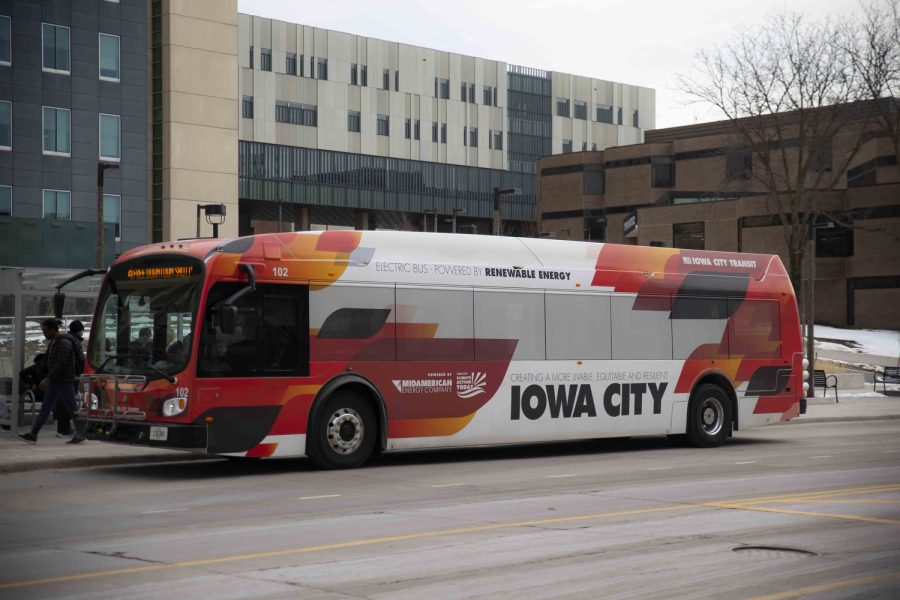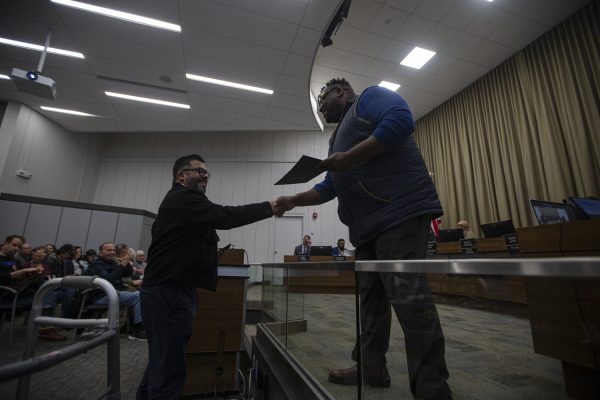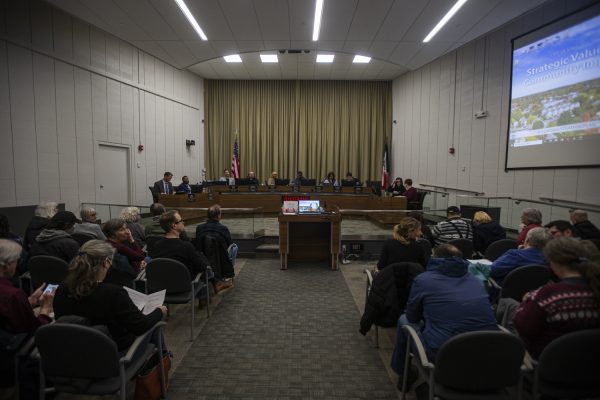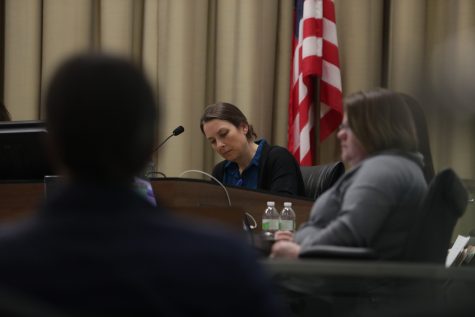Iowa City working on zero-fare transit system
The city is currently evaluating funding options to help implement a long term fare-free transit system.
A Proterra ZX5 electric bus operated by Iowa City Transit serves Route 4 Free Downtown Shuttle in front of the University of Iowa Main Libraries on Feb. 21, 2023.
March 1, 2023
Public transit users of Iowa City may see a city-wide zero-fare transit system in a few years.
City of Iowa City staff are looking into what it would take to implement a free transit system.
Geoff Fruin, City of Iowa City manager , wrote in an email sent to The Daily Iowan the idea of a zero-fare system was originally discussed in an Iowa City Area Transit Study.
A specific study on fares in the Iowa City area was conducted in September 2020 and analyzed the successes of zero-fare transit systems in several cities across the U.S., including Chapel Hill, North Carolina, Corvallis, Oregon, and Missoula, Montana.
The study found that after implementing a fare-free system, the ridership for these cities increased anywhere from 30 to 100 percent. The cities also reported several other positive benefits including increased productivity, lower travel and wait times for riders, and increased community pride.
RELATED: Iowa City plans to have a fully electric bus fleet in the future
The City of Iowa City is looking at potential funding sources in order to supplement the loss of revenue from fares and make a zero-fare system long term, said City of Iowa City Transportation Services Director Darian Nagle-Gamm.
Nagle-Gamm said the city is currently evaluating three funding avenues for this project: federal funding that is based on ridership revenue, remaining COVID-19 stimulus funds for the transportation department, and the city’s usual local funding for transportation.
She added city staff plans to present their findings to the city council later this spring. As of now, it is hard to place an exact timeline on when Iowa City citizens will see a zero-fare system as it depends on what funding avenue the city decides to go in, Nagle-Gamm said.
Once funding sources have been identified and secured, Nagle-Gamm said the transition to a fare-free system would be quick compared to other operational aspects, such as bus route changes.
“Transitioning to a zero-fare system would be very easy in comparison from an operations perspective because we simply could cover up the fare boxes on a given day and just stop charging fares,” Nagle-Gamm said. “We could do that transition really quickly versus some of our other changes to our system, which are a lot more intensive.”
Iowa City City Councilor Andrew Dunn said the council is unanimously in favor of a zero-fare transit system, but there are some concerns that will have to be addressed.
Dunn said that Iowa City and Coralville transit systems operate based on different policies such as fare rates, meaning that better collaboration and communication between the systems would be needed to make a free regional system work smoothly.
Additionally, Dunn added another issue would be increased administrative costs because more people would need to be hired to work on this goal.
Referencing the 2020 fare study, Dunn said that the communities examined found funding for a zero-fare system through various taxes, such as sales and utilities, or by partnerships with private entities or nonprofits.
Aside from these challenges, there are many benefits to a zero-fare transit system, Dunn said. A zero-fare system would be more accessible for people with all income levels and would help sustainability efforts by encouraging the public to ride public transit rather than drive themselves, he said.
“Simultaneously, the benefits can be seen in a little bit more of an abstract sense. With fewer cars on the road, you’re going to have less wear and tear on the roads. You have better-trained drivers who have to go through CDL training,” Dunn said. “So, we’re just going to see more safety on the roads, fewer people on the roads, less wear and tear on the roads, which means less money out of the city budget.”
CDL stands for commercial drivers license, which is needed for a person to be able to drive a bus.
From a University of Iowa student perspective, Undergraduate Student Government City Liaison and second-year UI student Keaton Zeimet said a zero-fare city transit system would eliminate a financial burden for students who live off-campus and need to take frequent bus trips.
He added that it would also help combat food insecurity for students by allowing them free transportation to grocery stores in Iowa City.
“It would just be a great thing for students, and it would be amazing to see in the city,” Zeimet said.














